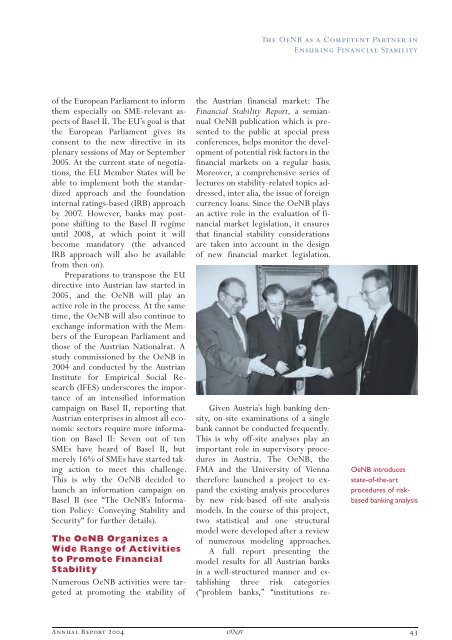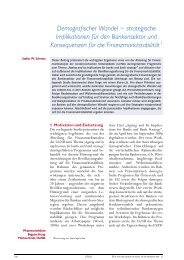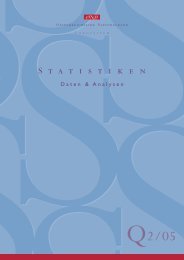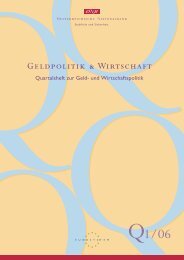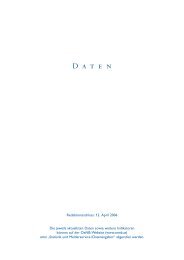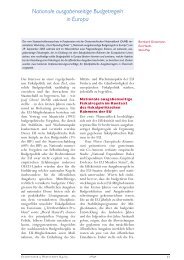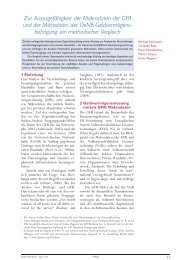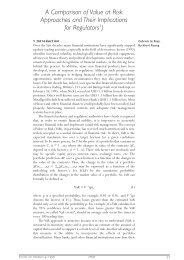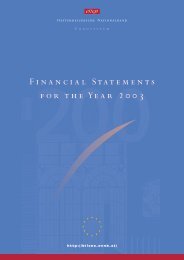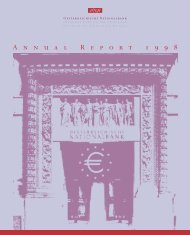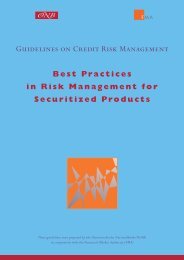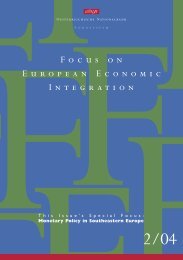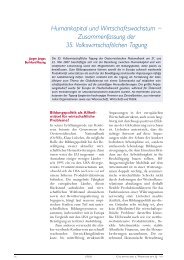Create successful ePaper yourself
Turn your PDF publications into a flip-book with our unique Google optimized e-Paper software.
of the European Parliament to inform<br />
them especially on SME-relevant aspects<br />
of Basel II. The EUÕs goal is that<br />
the European Parliament gives its<br />
consent to the new directive in its<br />
plenary sessions of May or September<br />
2005.Atthecurrentstateofnegotiations,<br />
the EU Member States will be<br />
able to implement both the standardized<br />
approach and the foundation<br />
internal ratings-based (IRB) approach<br />
by 2007. However, banks may postpone<br />
shifting to the Basel II regime<br />
until 2008, at which point it will<br />
become mandatory (the advanced<br />
IRB approach will also be available<br />
from then on).<br />
Preparations to transpose the EU<br />
directive into Austrian law started in<br />
2005, and the OeNB will play an<br />
active role in the process. At the same<br />
time, the OeNB will also continue to<br />
exchange information with the Members<br />
of the European Parliament and<br />
those of the Austrian Nationalrat. A<br />
study commissioned by the OeNB in<br />
<strong>2004</strong> and conducted by the Austrian<br />
Institute for Empirical Social Research<br />
(IFES) underscores the importance<br />
of an intensified information<br />
campaign on Basel II, reporting that<br />
Austrian enterprises in almost all economic<br />
sectors require more information<br />
on Basel II: Seven out of ten<br />
SMEs have heard of Basel II, but<br />
merely 16% of SMEs have started taking<br />
action to meet this challenge.<br />
This is why the OeNB decided to<br />
launch an information campaign on<br />
Basel II (see ÒThe OeNBÕs Information<br />
Policy: Conveying Stability and<br />
SecurityÒ for further details).<br />
The OeNB Organizes a<br />
Wide Range of Activities<br />
to Promote Financial<br />
Stability<br />
Numerous OeNB activities were targeted<br />
at promoting the stability of<br />
The OeNB as a Competent Partner in<br />
Ensuring Financial Stability<br />
the Austrian financial market: The<br />
Financial Stability <strong>Report</strong>, asemiannual<br />
OeNB publication which is presented<br />
to the public at special press<br />
conferences, helps monitor the development<br />
of potential risk factors in the<br />
financial markets on a regular basis.<br />
Moreover, a comprehensive series of<br />
lectures on stability-related topics addressed,<br />
inter alia, the issue of foreign<br />
currency loans. Since the OeNB plays<br />
an active role in the evaluation of financial<br />
market legislation, it ensures<br />
that financial stability considerations<br />
are taken into account in the design<br />
of new financial market legislation.<br />
Given AustriaÕs high banking density,<br />
on-site examinations of a single<br />
bank cannot be conducted frequently.<br />
This is why off-site analyses play an<br />
important role in supervisory procedures<br />
in Austria. The OeNB, the<br />
FMA and the University of Vienna<br />
therefore launched a project to expand<br />
the existing analysis procedures<br />
by new risk-based off-site analysis<br />
models. In the course of this project,<br />
two statistical and one structural<br />
model were developed after a review<br />
of numerous modeling approaches.<br />
A full report presenting the<br />
model results for all Austrian banks<br />
in a well-structured manner and establishing<br />
three risk categories<br />
(Òproblem banks,Ó Òinstitutions re-<br />
OeNB introduces<br />
state-of-the-art<br />
procedures of riskbased<br />
banking analysis<br />
<strong>Annual</strong> <strong>Report</strong> <strong>2004</strong> ×<br />
43


